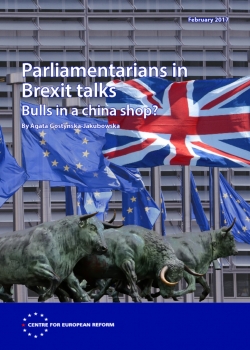
Parliamentarians in Brexit talks: Bulls in a china shop?
- Parliamentarians in Westminster and in the European Parliament will have to ratify the final withdrawal agreement between the EU-27 and the UK. MEPs have in the past used their veto in international negotiations when the European Commission and the member-states have not involved them properly in the negotiation process.
European leaders have agreed to brief the European Parliament before and after Council meetings at which ministers will discuss the negotiating mandate of the EU-27. The Parliament’s representative, Guy Verhofstadt, will also participate in the preparatory meetings of the European Council. But member-states have refused to allow him to join the EU’s negotiating team. Verhofstadt has threatened that MEPs could vote down the final withdrawal agreement if EU leaders do not change their minds.
If the European Parliament vetoed the exit deal, the UK would leave the EU without an agreement on migrants’ rights, customs arrangements or budget liabilities. This is as risky for the EU as it is for the UK.
Threatening to vote down the final withdrawal deal just to make a point about inter-institutional co-operation could undermine the European Parliament’s public standing. EU citizens expect MEPs to focus on addressing their problems rather than on playing power games.
UKGov has promised that Parliament wld exercise same level of scrutiny in #Brexit talks as #EP would
The British government has promised that Westminster would exercise the same level of scrutiny in the exit talks as the European Parliament. But it may argue that it cannot reveal its negotiating position to parliamentarians, lest it undermines its bargaining hand. However, there are ways to reconcile the confidentiality of negotiations with parliamentary scrutiny, and the British government should not keep Westminster in the dark about the progress of the exit talks.
The government should offer briefings to MPs and peers on so-called Privy Council terms, whereby participants promise not to reveal the information they obtain. It should also make reading rooms available for parliamentarians to view (but not copy) documents setting out the British negotiating position.
For its part, the British parliament should make an effort to understand its European counterparts. Parliamentarians should reach out to colleagues in the European Parliament and in other national parliaments to find out what red lines their governments will have in the exit talks.
- The UK is leaving the EU but it is not leaving Europe. Effective parliamentary scrutiny of the Brexit talks could set a precedent for better parliamentary oversight of post-Brexit British policy towards the EU.

